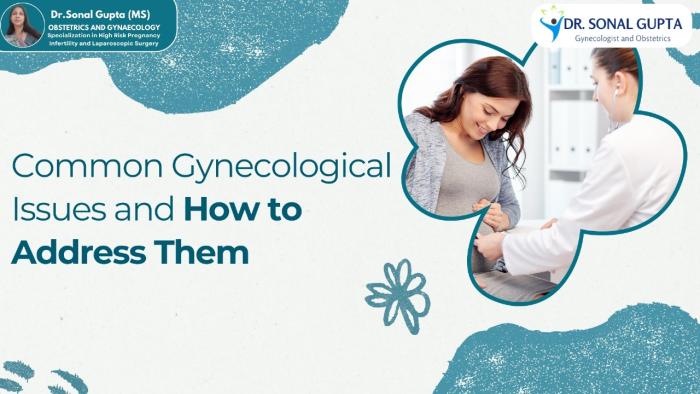- For Appointment: +91 9568139362
- Mon-Sat (10am - 8pm)
- drsonalgupta2@gmail.com
- Login

Dec 25, 2024 Dr Sonal Gupta
Common Gynecological Issues and How to Address Them
Learn about common gynecological problems like PCOS, endometriosis, and fibroids, and discover practical solutions to maintain optimal reproductive health.
Women often face a variety of gynecological issues throughout their lives, ranging from mild discomforts to more serious conditions. Early identification and treatment are key to ensuring these issues don’t escalate and affect overall well-being. Let’s explore some common gynecological problems and how to address them effectively.
1. Polycystic Ovary Syndrome (PCOS)
What is it? PCOS is a hormonal disorder characterized by irregular menstrual cycles, excessive androgen levels, and multiple small cysts on the ovaries.
Symptoms:
-
Irregular periods
-
Weight gain
-
Excess facial or body hair
-
Acne
How to Address It:
-
Lifestyle changes, including a balanced diet and regular exercise
-
Medications to regulate menstrual cycles and manage symptoms
-
Consulting a gynecologist for personalized treatment plans
2. Endometriosis
What is it? A condition where tissue similar to the lining of the uterus grows outside the uterus, causing pain and sometimes infertility.
Symptoms:
-
Severe pelvic pain
-
Pain during menstruation
-
Pain during intercourse
-
Infertility
How to Address It:
-
Pain management through over-the-counter medications
-
Hormonal therapies to reduce tissue growth
-
Surgical options in severe cases, such as laparoscopy
3. Uterine Fibroids
What are they? Non-cancerous growths in the uterus that can vary in size and number.
Symptoms:
-
Heavy menstrual bleeding
-
Pelvic pain or pressure
-
Frequent urination
-
Difficulty emptying the bladder
How to Address It:
-
Medications to manage symptoms and shrink fibroids
-
Minimally invasive procedures like uterine artery embolization
-
Surgical removal (myomectomy) for larger or symptomatic fibroids
4. Vaginal Infections
What are they? Infections caused by bacteria, yeast, or other microorganisms, commonly known as bacterial vaginosis or yeast infections.
Symptoms:
-
Unusual discharge
-
Itching or irritation
-
Foul odor
-
Pain during urination or intercourse
How to Address It:
-
Over-the-counter antifungal treatments for yeast infections
-
Antibiotics prescribed by a doctor for bacterial infections
-
Maintaining proper hygiene and wearing breathable fabrics
5. Menstrual Disorders
What are they? Disorders include irregular periods, heavy bleeding, or painful menstruation (dysmenorrhea).
Symptoms:
-
Missed or unpredictable periods
-
Severe cramping
-
Excessive bleeding during menstruation
How to Address It:
-
Tracking menstrual cycles to identify patterns
-
Hormonal therapies or birth control pills to regulate cycles
-
Pain relief through medications or natural remedies like heat therapy
6. Pelvic Inflammatory Disease (PID)
What is it? An infection of the reproductive organs, often caused by untreated sexually transmitted infections (STIs).
Symptoms:
-
Pain in the lower abdomen
-
Fever
-
Unusual discharge
-
Pain during intercourse
How to Address It:
-
Antibiotics prescribed by a healthcare provider
-
Early treatment to prevent complications
-
Practicing safe sex to reduce the risk of STIs
Promoting Gynecological Health
While it’s important to address specific issues, maintaining overall gynecological health is equally crucial. Here are some general tips:
-
Schedule regular check-ups with a gynecologist.
-
Practice good hygiene to prevent infections.
-
Maintain a healthy lifestyle with a balanced diet and regular exercise.
-
Stay informed about your body and seek medical advice when needed.
Conclusion
Gynecological issues are common, but they don’t have to disrupt your life. By understanding the symptoms and seeking timely medical care, women can effectively manage these conditions and maintain their health. For expert guidance and personalized care, consult Dr. Sonal Gupta at Ojas Hospital. Visit https://drsonalgupta.in/index.php to learn more and take the first step toward better gynecological health.
